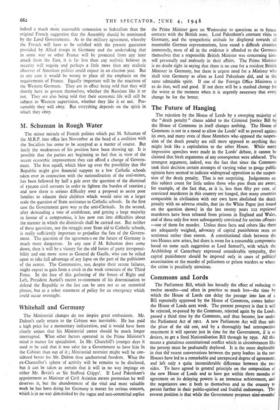M. Schuman in Rough Water
The minor miracle of French politics which put M. Schuman of the M.R.P. into office last November at the head of a coalition with the Socialists has come to be accepted as a matter of course. But lately the weaknesses of his position have been showing up. It is possible that the parties are beginning to feel that in view of the recent economic improvement they can afford a change of Govern- ment. The first squall, which blew up over the possihility that the Republic might give financial support to a few Catholic schools taken over in connection with the nationalisation of the coal-mines, has been followed by half a gale over the question of the dismissal of iso,000 civil servants in order to lighten the burden of taxation ; and now there is serious difficulty over a proposal to assist poor families to educate their children which would raise on a larger scale the question of State assistance to Catholic schools. In the first case the Government gave way to the anti-Clericals. In the second, after demanding a vote of confidence, and getting a large majority in favour of a compromise, it has now run into difficulties about the manner in which the dismissals shall be carried out. But neither of these questions, nor the struggle over State aid to Catholic schools, is really sufficiently important to prejudice the fate of the Govern- ment. The question of the agreemen.s on the future of Germany is much more dangerous. In any case if M. Schuman does come down, then it will be a victory for the old forces of party irresponsi- bility and one more score to General de Gaulle, who can be relied upon to take full advantage of any lapse on the part of the politicians of the centre. The Communists, too, despite their recent failures, might expect to gain from a crack in the weak structure of the Third Force. In the face of this gathering of the forces of Right and Left, President Auriol's recent re-statement of his determination to defend the Republic to the last can be seen not as an oratorical phrase, but as a sober statement of policy for an emergency which could occur overnight.


































 Previous page
Previous page